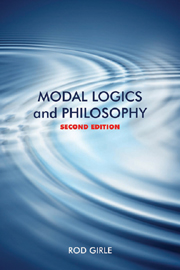Book contents
- Frontmatter
- Contents
- Preface
- Acknowledgements
- 1 Argument and modality
- Part 1 Formal systems
- 2 A simple modal logic
- 3 The normal modal logics
- 4 The non-normal modal logics
- 5 Natural deduction and axiomatics
- 6 Conditional logic
- 7 Modal predicate logics
- 8 Quantifiers and existence
- Part 2 Applications
- Answers
- Index
6 - Conditional logic
from Part 1 - Formal systems
- Frontmatter
- Contents
- Preface
- Acknowledgements
- 1 Argument and modality
- Part 1 Formal systems
- 2 A simple modal logic
- 3 The normal modal logics
- 4 The non-normal modal logics
- 5 Natural deduction and axiomatics
- 6 Conditional logic
- 7 Modal predicate logics
- 8 Quantifiers and existence
- Part 2 Applications
- Answers
- Index
Summary
Introduction
Modal logic has been used for purposes other than providing formal languages for necessity and possibility. In fact, at the very beginning of the creation of modern modal logic one of the main aims was to provide a formal language for conditional propositions, the propositions usually expressed by “If … then …” sentences. The major systematic development of early modal logic resulted in the five Lewis systems: S1 to S5. These were first developed as conditional logics. The whole enterprise grew out of a dissatisfaction with the use of the material conditional as the standard translation for “If … then …” and “… only if …”.
One early alternative idea was that “If p then q” should be understood not as “Either not p or q” but as “p is incompatible with not q” or as “It is not possible that p and not q”. Modal logic enters at once.
In this chapter we focus on a few of the formal systems of conditional logic. We shall look at a range of conditional logics and see what distinguishes one from the other. We shall not discuss directly the merits of any of the logics but simply note which formulas are theorems and which argument forms are valid. The question of which logic, if any, might be better than which will be discussed in Chapter 14 as part of a general philosophical discussion of conditionals. In this chapter we shall just look at formal features.
- Type
- Chapter
- Information
- Modal Logics and Philosophy , pp. 87 - 105Publisher: Acumen PublishingPrint publication year: 2009



